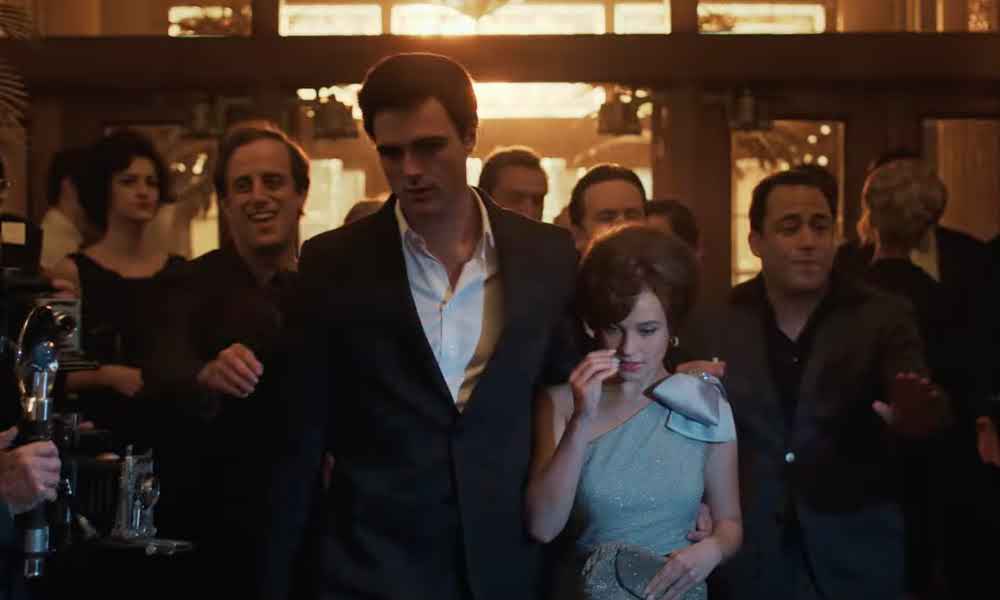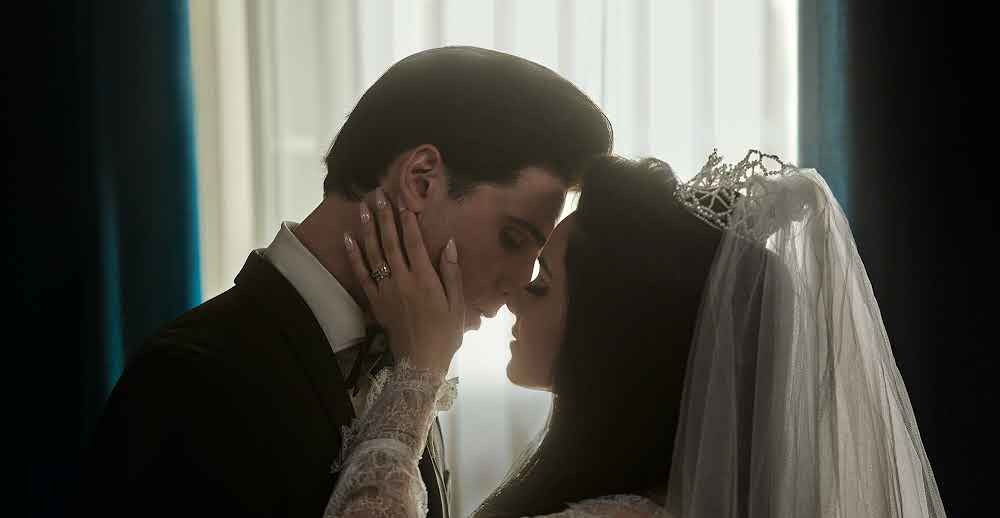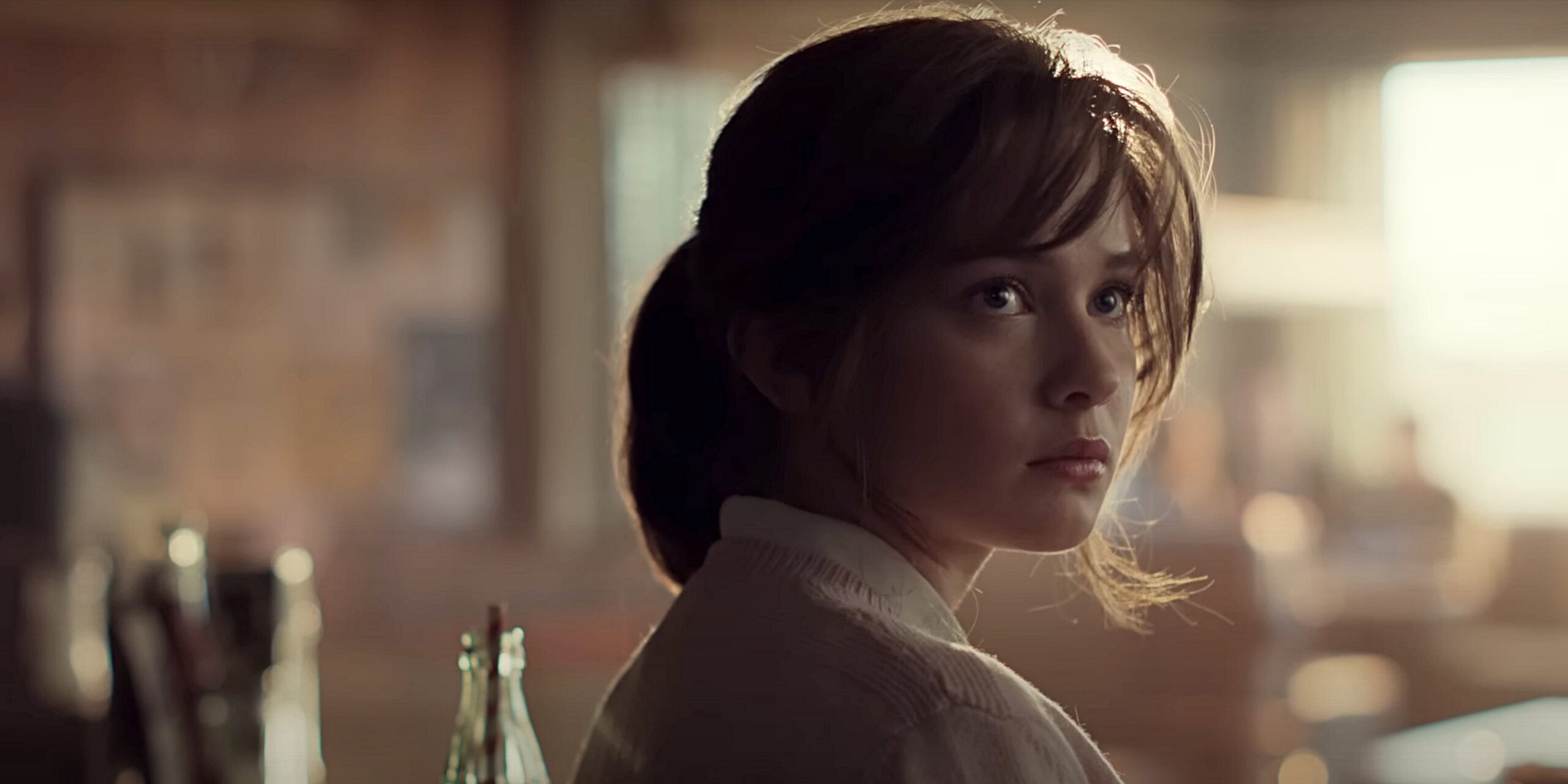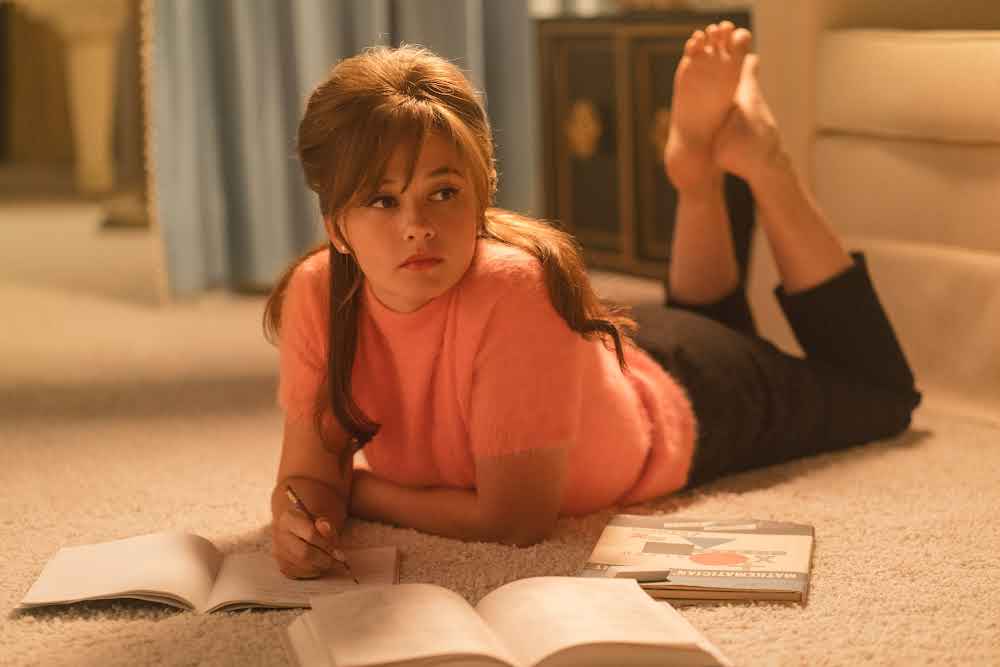Jacob Elordi, the man chosen by Sofia Coppola to play Elvis Presley, towers over Cailee Spaeny, the woman chosen by Coppola to play Priscilla Presley, in Coppola’s new film Priscilla. The discrepancy in their heights appears to be a full half of Spaeny’s body length. It’s a great way of encapsulating the infamous age difference between Presley and the young Priscilla Beaulieu, whom he met while stationed in Germany when she was only 14, and he was ten years older and already a world-famous heartthrob. It’s an unforgettable sort of cinematic magic, especially since Spaeny and Elordi are approximately the same age – a relief considering some of the scenes they must film together.
The section of the film that charts their initial courtship is undoubtedly the most interesting, given the circumstances of that courtship. First there’s the age difference itself, which meant parental consent for their every interaction, and that this parental consent was likely only granted because notions of romantic relationships with minors were considerably more quaint in 1959 – and of course because it was ELVIS PRESLEY, and wasn’t that intoxicating on some level, even for the parents.
Then there’s the fact that, according to Priscilla’s memoir Elvis & Me on which this was based, the star musician was in fact a gentleman with her, holding off on the full extent of their possible physical intimacy until she was at least closer to the age of consent. Finally there’s the little detail that they were separated for more than two years after he finished his military service, during which time his fame and temptation both increased exponentially. When they finally reunited, she still had to finish high school in Memphis under the care of the Presley family. This unlikely chain of events resulted in a marriage and a child, Lisa Marie, who has now followed her father to the grave (while Priscilla is still alive at age 78).
It’s the film’s “what’s it like to be married to a famous person” section where even Coppola’s signature touches and musical choices can’t prevent Priscilla from feeling banal. Even though their actual wedding comes late within the narrative – a full five years after they are reunited, in May of 1967 – the conditions of being in a marriage with Elvis have effectively been in place the whole time: the rumours of Elvis’ cheating, some of which he actually admits; the popping of pills; the wild mood swings by the singer, which range from disdain and violence one minute to apologetic pleading the next. Perhaps it’s these things that feel so typical of any rock n’ roll marriage, and would have benefited from the sort of abstractions Coppola has given us in the past, instead of just recreation and documentation.
Within this less successful portion of the film, though, there manage to be surprises. One of these is the scene where Elvis, apparently incapable of recognising his own monstrous callousness, tells Priscilla with a straight face that they need a break from one another. The reverse shot shows that she is likely in the final trimester of her pregnancy. Because theirs has been such an imbalanced power dynamic, and because she has been so beaten down by similar indignities, she accepts his suggestion with only a mild display of perturbance, rather than screaming back at him as she might have wanted to. Of course, this only sets him scrambling back and once again reconsidering his own rash reaction to some way he believes she has triggered him, when really she seems to have been quite incapable of that.
When the psychologies are delved into thus, it makes the presentation seem more interesting than it actually is. It’s consistent with Coppola’s filmmaking style not to show us the highlight reel moments of a marriage, rather, the telling in-between moments. For example, she depicts the pair going to the hospital to give birth to Lisa Marie, then straight to holding the baby in their arms at home some time later. It’s not Coppola’s intention to show Priscilla screaming in pain while giving birth, because again, screaming is not really Coppola’s thing, and the narrative does not need it. But Priscilla’s in-between moments – bored at school, playing with the poodle Elvis distracts her with while he’s away in Hollywood, trying on outfits she doesn’t care about – stultify us in a way beyond what seems to be Coppola’s intent. In the end, they sort of dissipate into a flatline, as does the movie, with an abrupt ending that feels underbaked.
We get glimpses of Coppola’s finest work throughout, but it’s her ability to effectively employ them that has dulled over a directing career that is now 25 years old. Music is a cherished design detail for Coppola – she’s even married to Phoenix lead singer Thomas Mars, who serves as music supervisor here. The Priscilla music choices feel heavy handed, though. Where “I Want Candy” was a perfect accompaniment to scenes of pastry indulgence in Marie Antoinette, clear why it was chosen but made surprising by the anachronistic appearance in a movie set in the 18th century, here Coppola uses Tommy James and the Shondells’ “Crimson and Clover” during a scene of their first meeting, its line “I don’t hardly know her” seeming too on the nose by half. And the ways Priscilla is her own sort of Marie Antoinette-style queen don’t get explored with any verve or stylistic flourish.
The casting of the leads, though, is a strength. Spaeny’s trick of de-ageing herself to an early teen is just the first asset she brings to the table. The innocence she projects, especially in those early scenes, explains why Elvis felt so beguiled by her, even as he was surrounded by more obviously available women eager to give him anything and everything. Elordi is also a find, and is having a breakout year after his appearance in Saltburn. His Elvis portrayal is quite dissimilar to the one that earned Austin Butler an Oscar nomination last year, yet feels equally true to the essence of the man, which just shows you the multiplicity of useful interpretations of one of the 20th century’s most iconic figures.
If Priscilla is a mild disappointment, it’s only by the standards of Coppola’s own career. It’s not that she’s always hit, but that she’s always given us a distinct vision that seemed unconcerned with whether it would hit. Priscilla doesn’t seem like a conscious effort to deliver a more accessible vision, nor does it seem sanitised due to the actual Priscilla Presley’s involvement as executive producer. It just feels a bit limp. Coppola’s misses are better than most people’s hits, and there’s enough about Priscilla that hits to warrant a viewing.
Priscilla opened yesterday in cinemas.



